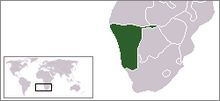LGBT rights in Namibia
| LGBT rights in Namibia | |
|---|---|

|
|
| Same-sex sexual activity legal? | Male illegal since 1920 |
| Discrimination protections | No |
| Family rights | |
| Recognition of relationships |
No |
| Adoption | No |
Namibia has a history lacking of laws supporting lesbian, gay, bisexual, and transgender (LGBT) citizens. Discrimination based on sexual orientation and gender identity is not banned in Namibia. Households headed by same-sex couples are not eligible for the same legal protections available to opposite-sex couples.
In November 2012, the LGBT community celebrated the crowing of Ricardo Amunjera as Mr Gay Namibia. The pagent took place at a theatre-restaurant in the capital city, Windhoek. Amunjera went on to later marry his life partner in 2013.
Sexual activity between women is legal in Namibia. Sodomy between men remains a crime in the country according to the Roman-Dutch common-law, which was imposed by the South Africans. Namibia kept this law on the books after it became independent in 1990. However, there are no cases in which this law was ever enforced.
In August 2016, the United Nations Human Rights Committee released a report in Windhoek, Namibia's capital city, calling on the country to abolish its sodomy ban. Reacting to the Committee's call, John Walters, the Ombudsman of Namibia, whose office is mandated to promote and protect human rights, said that people should be free to live their lives as they see fit. Walters said:
I think the old sodomy law has served its purpose. How many prosecutions have there been? I believe none over the past 20 years. If we don’t prosecute people, why do we have the act?
The Ombudsman of Namibia, spoke in August 2016 on the matter of same-sex marriage and said the following:
If people of the same sex would like to get married, it is their choice, whether the country, the community, churches and government acknowledge that [is something else].
Discrimination on the basis of sexual orientation and gender identity is not outlawed in Namibia.
In August 2016, the United Nations Human Rights Committee called on the Government to adopt legislation explicitly prohibiting discrimination based on sexual orientation, including in the Labour Act (Act No. 11 of 2007). Following the Committee's call, the Ombudsman of Namibia, argued that a measure prohibiting discrimination on the ground of sexual orientation needs to be in the Constitution.
...
Wikipedia
